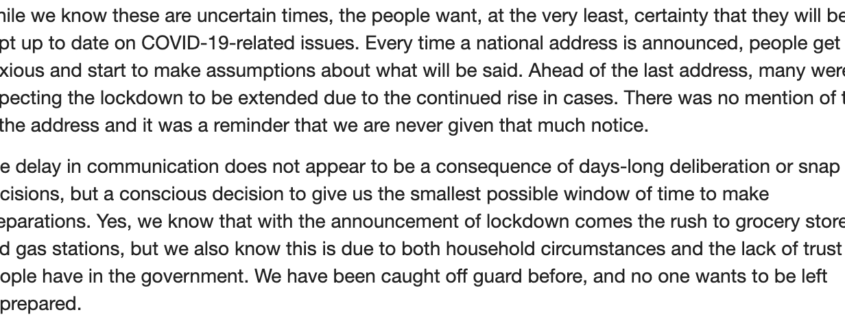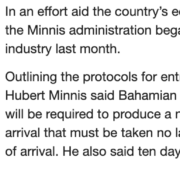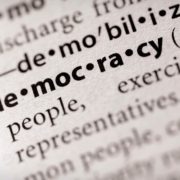We are now in our second week of lockdown and received a national address from the Prime Minister on Sunday evening which gave very little information. Last week’s Ministry of Health briefing gave the usual information, though all of the questions posed by journalists were not answered. In response to some of them, health officials said the Prime Minister would address the issues on Sunday. Unsurprisingly, he did not.
Since the action by doctors and nurses, we have been asking for details on the PPE inventory and availability. This was glossed over with no numbers or policies provided. It was only said that there are PPE supplies available and they are topped up as needed. We do not know who controls access to them, how often staff are able to change them, if there was ever a shortage, or why there is a huge gap between reports from doctors and nurses and those from authorities. This needs to be properly addressed.
PPE is not the only issue on which authorities refuse to give clarity. It was not even possible to probe further as the Prime Minister insists on giving national addresses instead of press conferences which allow for questions from the press. One-sided communication is insufficient and unacceptable. The government works for us and it needs to answer our questions.
The Prime Minister’s limited communication with the nation has been severely lacking. His speeches are still padded, far too long and condescending. National addresses should not be sermons. They should not be lectures. They should not be scoldings. At the very least, they should provide basic information and respond to the questions deferred from the previous Ministry of Health press briefing.
Is no one making note of those unanswered questions? There is specific information Bahamians would like to have. What changes have been made to the budget? What is being done to prepare the hospital and other facilities to handle the increase in COVID-19 cases? What is the current pace of the National Insurance Board and Social Services in fulfilling requests for benefits and assistance and what changes are being made to accommodate more people and expedite the process? What factors will determine whether or not the lockdown is extended beyond the set two weeks?
In a 45-minute address, these kinds of details should be clearly communicated.
While we know these are uncertain times, the people want, at the very least, certainty that they will be kept up to date on COVID-19-related issues. Every time a national address is announced, people get anxious and start to make assumptions about what will be said. Ahead of the last address, many were expecting the lockdown to be extended due to the continued rise in cases. There was no mention of this in the address and it was a reminder that we are never given that much notice.
The delay in communication does not appear to be a consequence of days-long deliberation or snap decisions, but a conscious decision to give us the smallest possible window of time to make preparations. Yes, we know that with the announcement of lockdown comes the rush to grocery stores and gas stations, but we also know this is due to both household circumstances and the lack of trust people have in the government. We have been caught off guard before, and no one wants to be left unprepared.
There is a need to build trust and assure people that they will be able to get what they need. If this does not happen, there will always be a rush, and the small windows for preparation do not alleviate this. Instead, they concentrate it. This tactic does not make sense.
This country is not a kingdom or a classroom and should not be treated as such. We need clear communication, and that includes letting us know when authorities are considering a particular action that will affect our daily lives. It is not much to ask. If this lockdown is to be extended, the least the Prime Minister could do is let us know before this weekend so we are not all at the grocery store on Monday.
Have a plan to handle the lockdown at home
At this point, it makes sense for households and individuals to have lockdown plans in place. Here are some items to include in those plans.
-
Decide who will be responsible for household errands. This person does the grocery shopping, fills prescriptions, gets water, and anything else that will likely require queueing. This person has a routine they meticulously follow to ensure that their household is not compromised. This may include taking no personal items aside from a card or cash for payment into the place of business, wearing gloves while in-store and handling packages (which requires a well-thought out plan), and calling someone to open the door to the house so they don’t touch anything. This should be the person in the best health.
-
Do as much as possible online. Set up online bill payment with utility companies to avoid more lines and time in close quarters with other people. Ask your bank about paying bills using online banking. If you are nervous about using your credit or debit card online, there are ways to make payments directly from your bank account. You can all purchase a gift card to be used during lockdown for bill payment, ensuring that potential compromises have no effect on your bank account.
-
Get on the same page with everyone in your household. If anyone breaks the lockdown, everyone in the household is at risk. Households should not mix. Agree to give up the parties and other events you usually host or attend, or find ways to do them virtually. The lockdown puts a barrier between you and other people. Don’t think only of the person you want to see outside of your household, but all of the people to whom they have been exposed, and the people to whom they have been exposed. You do not want to be a part of a contact-tracing chain, so stick with your household and get everyone else to do the same.
-
Set up a workstation if you and others in your household need to work from home. It can be tempting to operate from your bedroom, but this can disrupt your sleep. Choose a space with good lighting, strong wifi (or the strongest available in your house), a cooling device, and a proper chair. Make it a practice to sit there during work hours so your brain understands what it needs to do when you are in that position and location.
-
Share the load. No one person should be expected to work from home, keep the house clean, occupy and supervise the children, and prepare meals. Figure out how to balance the workload.
-
Check in with yourself every day. Pay attention to the way your body feels, the way you are progressing with work, and your mood. Make sure you are eating on time, drinking enough water, getting fresh air, and able to think and talk about more than just the current circumstances. If you are in need of mental health support, call the Bahamas Psychological Association hotline—819-7652, 816-3799, 812-0576, or 815-5850.
As we spend more time at home, it can be tempting to fall into habits like working in bed, binge watching television shows, eating all day, and online shopping. Pay attention to the amount of time spent on these activities, the financial cost, and the effects on your well-being. There is a difference between a carefree day and general disorder. By now, you know what you are likely to do and can identify your coping mechanisms. Give yourself allowances and limitations. If you need help finding balance, ask someone in your household to help or set up a virtual buddy system. We are all trying to make it through difficult days. Remember that others are working through some of the same challenges and talking about them, setting goals together, and checking in can help. Even though we should not physically gather, don’t underestimate the importance of community.
Published in my weekly column in The Tribune on August 12, 2020.












Leave a Reply
Want to join the discussion?Feel free to contribute!